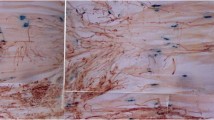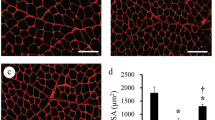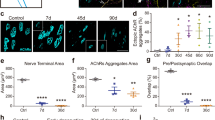Abstract
This study tests the effects of chronic electrostimulation on denervated/reinnervated skeletal muscle in producing an optimal restoration of size and mechanical and histochemical properties. We compared tibialis anterior muscles in four groups of rats: in unoperated control (C) and 10 weeks following nerve lesion with suture (LS) in the absence of electrostimulation and in the presence of muscle stimulation with either a monophasic rectangular current (LSEm) or a biphasic modulated current (LSEb). The main results were (1) muscle atrophy was reduced in LSEm (−26%) while it was absent in LSEb groups (−8%); (2) the peak twitch amplitude decreased in LS and LSEm but not in LSEb groups, whereas the contraction time was shorter; (3) muscle reinnervation was associated with the emergence of type IIC fibers and proportions of types I, IIA and IIB fibers recovered in the superficial portion of LSEb muscles; (4) the ratio of oxidative to glycolytic activities decreased in the three groups with nerve injury and repair; however, this decrease was more accentuated in LSEm groups. We conclude that muscle electrostimulation following denervation and reinnervation tends to restore size and functional and histochemical properties during reinnervation better than is seen in unstimulated muscle.



Similar content being viewed by others
Abbreviations
- A:
-
Amplitude
- C:
-
Control group (unoperated)
- CS:
-
Citrate synthase
- CT:
-
Contraction time
- EIF:
-
Electrically induced fatigue
- IFG-1:
-
Insulin-like growth factor 1
- L:
-
Nerve lesion
- LDH:
-
Lactate dehydrogenase
- LS:
-
Lesion and suture of the nerve
- LSEm :
-
Lesion and suture of the nerve, plus electrostimulation with a monophasic current
- LSEb :
-
Lesion and suture of the nerve, plus electrostimulation with a biphasic current
- MGF:
-
Muscle growth factor
- MRR:
-
Maximum relaxation rate
References
Anderl H (1977) Cross-face nerve transplantation in fascial palsy. Proc R Soc Med 70:143–144
Ausoni S, Gorza L, Schiaffino S, Gundersen K, Lomo T (1990) Expression of myosin heavy chain isoforms in stimulated fast and slow rat muscles. J Neurosci 10:153–160
Bain JR, Veltri KL, Chamberlain D, Fahnestock M (2001) Improved functional recovery of denervated skeletal muscle after temporary sensory nerve innervation. Neuroscience 103:503–510
Balice-Gordon RJ, Thompson WJ (1988) The organization and development of compartmentalized innervation in rat extensor digitorum longus muscle. J Physiol 398:211–231
Bar A, Pette D (1988) Three fast myosin heavy chains in adult rat skeletal muscle. FEBS Lett 235(1–2):153–155
Booth FW, Thomason DB (1991) Molecular and cellular adaptation of muscle in response to exercise: perspectives of various models. Physiol Rev 71:541–585
Boudriau S, Cote CH, Vincent M, Houle P, Tremblay RR, Rogers PA (1996) Remodeling of the cytoskeletal lattice in denervated skeletal muscle. Muscle Nerve 19:1383–1390
Briggs FN, Poland JL, Solaro RJ (1977) Relative capabilities of sarcoplasmic reticulum in fast and slow mammalian skeletal muscles. J Physiol 266:587–594
Brooke MH, Kaiser KK (1970) Muscle fiber types: how many and what kind? Arch Neurol 23:369–379
Brown JM, Henriksson J, Salmons S (1989) Restoration of fast muscle characteristics following cessation of chronic stimulation: physiological, histochemical and metabolic changes during slow-to-fast transformation. Proc R Soc Lond B Biol Sci 235:321–346
Carlsen RC, Klein HW, Matthews CC, Gourley IM (1987) Recovery of free muscle grafts in rat: improvement is associated with an increase in cyclic adenosine monophosphate concentration or use of the condition/test paradigm. Exp Neurol 98:616–632
Carlson BM, Faulkner JA (1988) Reinnervation of long-term denervated rat muscle freely grafted into an innervated limb. Exp Neurol 102:50–56
Carlson BM, Hnik P, Tucek S, Vejsada R, Bader DM, Faulkner JA (1981) Comparison between grafts with intact nerves and standard free grafts of the rat extensor digitorum longus muscle. Physiol Bohemoslov 30:505–514
Carlson BM, Billington L, Faulkner J (1996) Studies on the regenerative recovery of long-term denervated muscle in rats. Res Neurol Neurosci 10:77–84
Carraro U, Catani C, Belluco S, Cantini M, Marchioro L (1986) Slow-like electrostimulation switches on slow myosin in denervated fast muscle. Exp Neurol 94:537–553
Carraro U, Catani C, Saggin L, Zrunek M, Szabolcs M, Gruber H, Streinzer W, Mayr W, Thoma H (1988) Isomyosin changes after functional electrostimulation of denervated sheep muscle. Muscle Nerve 11:1016–1028
Chi MM, Hintz CS, Henriksson J, Salmons S, Hellendahl RP, Park JL, Nemeth PM, Lowry OH (1986) Chronic stimulation of mammalian muscle: enzyme changes in individual fibers. Am J Physiol 251:633–642
Close R (1969) Dynamic properties of fast and slow skeletal muscles of the rat after nerve cross-union. J Physiol 204:331–346
Csukly K, Marqueste T, Gardiner P (2005) Sensitivity of rat soleus muscle to a mechanical stimulus is decreased following hindlimb unweighting. Eur J Appl Physiol 95(2–3):243–249
Curwin S, Stanish WD, Valiant G (1980) Clinical applications and biochemical effects of high frequency electrical stimulation. Can Athl Trainers Assoc J 6:15–16
Decherchi P, Vuillon-Cacciutolo G, Darques JL, Jammes Y (2001) Changes in afferent activities from tibialis anterior muscle after nerve repair by self-anastomosis. Muscle Nerve 24:59–68
Delp MD, Duan C (1996) Composition and size of type I, IIA, IID/X, and IIB fibers and citrate synthase activity of rat muscle. J Appl Physiol 80:261–270
Desplanches D, Mayet MH, Sempore B, Flandrois R (1987) Structural and functional responses to prolonged hindlimb suspension in rat muscle. J Appl Physiol 63:558–563
Eberstein A, Pachter BR (1986) The effect of electrical stimulation on reinnervation of rat muscle: contractile properties and endplate morphometry. Brain Res 384(2):304–310
Eken T, Gundersen K (1988) Electrical stimulation resembling normal motor-unit activity: effects on denervated fast and slow rat muscles. J Physiol 402:651–669
Eriksson E, Haggmark T (1979) Comparison of isometric muscle training and electrical stimulation supplementing isometric muscle training in the recovery after major knee ligament surgery. A preliminary report. Am J Sports Med 7:169–171
Esau SA, Bellemare F, Grassino A, Permutt S, Roussos C, Pardy RL (1983) Changes in relaxation rate with diaphragmatic fatigue in humans. J Appl Physiol 54:1353–1360
Faucher M, Guillot C, Marqueste T, Kipson N, Mayet-Sornay MH, Desplanches D, Jammes Y, Badier M (2005) Matched adaptations of electrophysiological, physiological, and histological properties of skeletal muscles in response to chronic hypoxia. Pflugers Arch 450:45–52
Gatchalian CL, Schachner M, Sanes JR (1989) Fibroblasts that proliferate near denervated synaptic sites in skeletal muscle synthesize the adhesive molecules tenascin(J1), N-CAM, fibronectin, and a heparan sulfate proteoglycan. J Cell Biol 108:873–1890
Gillespie MJ, Gordon T, Murphy PR (1987) Motor units and histochemistry in rat lateral gastrocnemius and soleus muscles: evidence for dissociation of physiological and histochemical properties after reinnervation. J Neurophysiol 57:921–937
Goldspink G (1999) Changes in muscle mass and phenotype and the expression of autocrine and systemic growth factors by muscle in response to stretch and overload. J Anat 194:323–334
Goldspink G, Yang SY (2001) Effects of activity on growth factor expression. Int J Sport Nutr Exerc Metab 11:21–27
Gordon T, Mao J (1994) Muscle atrophy and procedures for training after spinal cord injury. Phys Ther 74:50–60
Gorza L, Gundersen K, Lomo T, Schiaffino S, Westgaard RH (1988) Slow-to-fast transformation of denervated soleus muscles by chronic high-frequency stimulation in the rat. J Physiol 402:627–649
Grandmontagne M, Vaage O, Kopke Vollestad N, Hermansen L (1982) Confrontation de methods histochimiques et d’immunofluorescence pour le typage des fibres du muscle squelettique de rat (Abstract). J Physiol Paris 78:14A
Graziotti GH, Rios CM, Rivero JL (2001) Evidence for three fast myosin heavy chain isoforms in type II skeletal muscle fibers in the adult llama (Lama glama). J Histochem Cytochem 49:1033–1044
Green HJ, Klug GA, Reichmann H, Seedorf U, Wiehrer W, Pette D (1984) Exercise-induced fibre type transitions with regard to myosin, parvalbumin, and sarcoplasmic reticulum in muscles of the rat. Pflugers Arch 400:432–438
Green HJ, Reichmann H, Pette D (1984) Inter- and intraspecies comparisons of fibre type distribution and of succinate dehydrogenase activity in type I, IIA and IIB fibres of mammalian diaphragms. Histochemistry 81:67–73
Gulati AK (1988) Long-term retention of regenerative capability after denervation of skeletal muscle, and dependency of late differentiation on innervation. Anat Rec 220:429–434
Gundersen K (1998) Determination of muscle contractile properties: the importance of the nerve. Acta Physiol Scand 162:333–341
Gundersen K, Leberer E, Lomo T, Pette D, Staron RS (1988) Fibre types, calcium-sequestering proteins and metabolic enzymes in denervated and chronically stimulated muscles of the rat. J Physiol 398:177–189
Guth L, Samaha FJ (1969) Qualitative differences between actomyosin ATPase of slow and fast mammalian muscle. Exp Neurol 25:138–152
Gutmann E (ed) (1962) The denervated muscle. Czechoslovak Academy of Sciences, Praha
Gutmann E (1973) Basic mechanisms and effects of muscular activity and inactivity. Fysiatr Revmatol Vestn 51:125–127
Hamalainen N, Pette D (1996) Slow-to-fast transitions in myosin expression of rat soleus muscle by phasic high-frequency stimulation. FEBS Lett 399:220–222
Hennig R, Lomo T (1985) Firing patterns of motor units in normal rats. Nature 314:164–166
Hennig R, Lomo T (1987) Effects of chronic stimulation on the size and speed of long-term denervated and innervated rat fast and slow skeletal muscles. Acta Physiol Scand 130:115–131
Henriksson J, Chi MM, Hintz CS, Young DA, Kaiser KK, Salmons S, Lowry OH (1986) Chronic stimulation of mammalian muscle: changes in enzymes of six metabolic pathways. Am J Physiol 251:614–632
Hintz CS, Coyle EF, Kaiser KK, Chi MM, Lowry OH (1984) Comparison of muscle fiber typing by quantitative enzyme assays and by myosin ATPase staining. J Histochem Cytochem 32:655–660
Jakubiec-Puka A, Kordowska J, Catani C, Carraro U (1990) Myosin heavy chain isoform composition in striated muscle after denervation and self-reinnervation. Eur J Biochem 193:623–628
Jakubiec-Puka A, Ciechomska I, Morga J, Matusiak A (1999) Contents of myosin heavy chains in denervated slow and fast rat leg muscles. Comp Biochem Physiol B Biochem Mol Biol 122:355–362
Jammes Y, Collett P, Lenoir P, Lama A, Berthelin F, Roussos C (1991) Diaphragmatic fatigue produced by constant or modulated electric currents. Muscle Nerve 14:27–34
Jarvis JC, Sutherland H, Mayne CN, Gilroy SJ, Salmons S (1996) Induction of a fast-oxidative phenotype by chronic muscle stimulation: mechanical and biochemical studies. Am J Physiol 270:306–312
Kanaya F, Tajima T (1992) Effect of electrostimulation on denervated muscle. Clin Orthop Relat Res Oct:296–301
Kern H, Boncompagni S, Rossini K, Mayr W, Fano G, Zanin ME, Podhorska-Okolow M, Protasi F, Carraro U (2004) Long-term denervation in humans causes degeneration of both contractile and excitation-contraction coupling apparatus, which is reversible by functional electrical stimulation (FES): a role for myofiber regeneration? Neuropathol Exp Neurol 63(9):919–931
Klein HW, Carlsen RC, Gourley I (1988) Pharmacologic enhancement of functional recovery in free muscle transfers. J Reconstr Microsurg 4:277–281, 283–284
Kostyukov AI, Hellstrom F, Korchak OE, Radovanovic S, Ljubisavljevic M, Windhorst U, Johansson H (2000) Fatigue effects in the cat gastrocnemius during frequency-modulated efferent stimulation. Neuroscience 97:789–799
LaFramboise WA, Daood MJ, Guthrie RD, Moretti P, Schiaffino S, Ontell M (1990) Electrophoretic separation and immunological identification of type 2X myosin heavy chain in rat skeletal muscle. Biochim Biophys Acta 1035:109–112
Lopez-Guajardo A, Sutherland H, Jarvis JC, Salmons S (2000) Dynamics of stimulation-induced muscle adaptation: insights from varying the duty cycle. J Muscle Res Cell Motil 21:725–735
Lopez-Guajardo A, Sutherland H, Jarvis JC, Salmons S (2001) Induction of a fatigue-resistant phenotype in rabbit fast muscle by small daily amounts of stimulation. J Appl Physiol 90:1909–1918
Love FM, Son YJ, Thompson WJ (2003) Activity alters muscle reinnervation and terminal sprouting by reducing the number of Schwann cell pathways that grow to link synaptic sites. J Neurobiol 54(4):566–576
Lowry OH, Passonneau JV (ed) (1972) A flexible system of enzymatic analysis. Academic Press, New York
Lowry OH, Rosebrough NJ, Farr AL, Randall RJ (1951) Protein measurement with the Folin phenol reagent. J Biol Chem 193:265–275
Marqueste T, Decherchi P, Dousset E, Berthelin F, Jammes Y (2002) Effect of muscle electrostimulation on afferent activities from tibialis anterior muscle after nerve repair by self-anastomosis. Neuroscience 113:257–271
Marqueste T, Hug F, Decherchi P, Jammes Y (2003) Changes in neuromuscular function after training by functional electrical stimulation. Muscle Nerve 28(2):181–188
Marqueste T, Alliez JR, Alluin O, Jammes Y, Decherchi P (2004) Neuromuscular rehabilitation by treadmill running or electrical stimulation after peripheral nerve injury and repair. J Appl Physiol 96:1988–1995
Mayne CN, Sutherland H, Jarvis JC, Gilroy SJ, Craven AJ, Salmons S (1996) Induction of a fast-oxidative phenotype by chronic muscle stimulation: histochemical and metabolic studies. Am J Physiol 270:313–320
McKoy G, Ashley W, Mander J, Yang SY, Williams N, Russell B, Goldspink G (2002) Expression of insulin growth factor-1 splice variants and structural genes in rabbit skeletal muscle induced by stretch and stimulation. J Physiol 516:583–592
Mira JC, Janmot C, Couteaux R, d’Albis A (1992) Reinnervation of denervated extensor digitorum longus of the rat by the nerve of the soleus does not induce the type I myosin synthesis directly but through a sequential transition of type II myosin isoforms. Neurosci Lett 141:223–226
Pachter BR, Eberstein A (1983) Endplate postsynaptic structure dependent upon muscle activity. Neurosci Lett 43(2–3):277–283
Pette D, Staron RS (2000) Myosin isoforms, muscle fiber types, and transitions. Microsc Res Tech 50:500–509
Pette D, Vrbova G (1992) Adaptation of mammalian skeletal muscle fibers to chronic electrical stimulation. Rev Physiol Biochem Pharmacol 120:115–202
Pette D, Muller W, Leisner E, Vrbova G (1976) Time dependent effects on contractile properties, fibre population, myosin light chains and enzymes of energy metabolism in intermittently and continuously stimulated fast twitch muscles of the rabbit. Pflugers Arch 364:103–112
Pierobon-Bormioli S, Sartore S, Libera LD, Vitadello M, Schiaffino S (1987) “Fast” isomyosins and fiber types in mammalian skeletal muscle. J Histochem Cytochem 29:1179–1188
Reichmann H, Nix WA (1985) Changes of energy metabolism, myosin light chain composition, lactate dehydrogenase isozyme pattern and fibre type distribution of denervated fast-twitch muscle from rabbit after low frequency stimulation. Pflugers Arch 405:244–249
Reichmann H, Srihari T, Pette D (1983) Ipsi- and contralateral fibre transformations by cross-reinnervation. A principle of symmetry. Pflugers Arch 397:202–208
Rosser BW, Norris BJ, Nemeth PM (1992) Metabolic capacity of individual muscle fibers from different anatomic locations. J Histochem Cytochem 40:819–825
Sakakima H, Yoshida Y (2003) Effects of short duration static stretching on the denervated and reinnervated soleus muscle morphology in the rat. Arch Phys Med Rehabil 84(9):1339–1342
Salmons S, Sreter FA (1976) Significance of impulse activity in the transformation of skeletal muscle type. Nature 263:30–34
Salmons S, Ashley Z, Sutherland H, Russold MF, Li F, Jarvis JC (2005) Functional electrical stimulation of denervated muscles: basic issues. Artif Organs 29(3):199–202
Schiaffino S, Gorza L, Sartore S, Saggin L, Ausoni S, Vianello M, Gundersen K, Lomo T (1989) Three myosin heavy chain isoforms in type 2 skeletal muscle fibres. J Muscle Res Cell Motil 10:197–205
Siironen J, Sandberg M, Vuorinen V, Roytta M (1992) Expression of type I and III collagens and fibronectin after transection of rat sciatic nerve. Reinnervation compared with denervation. Lab Invest 67:80–87
Srere PA (1969) Citrate synthase. Methods Enzymol 13:3–5
Staron RS, Kraemer WJ, Hikida RS, Fry AC, Murray JD, Campos GE (1999) Fiber type composition of four hindlimb muscles of adult Fisher 344 rats. Histochem Cell Biol 111:117–123
Sunderland S (1978) Nerve and nerve injuries, 2nd edn. Churchill-Livingston, Edinburgh
Terzis J, Faibisoff B, Williams B (1975) The nerve gap: suture under tension vs. graft. Plast Reconstr Surg 56:166–170
Thomas CK, Nelson G, Than L, Zijdewind I (2002) Motor unit activation order during electrically evoked contractions of paralyzed or partially paralyzed muscles. Muscle Nerve 25:797–804
Totosy de Zepetnek JE, Zung HV, Erdebil S, Gordon T (1992) Motor-unit categorization based on contractile and histochemical properties: a glycogen depletion analysis of normal and reinnervated rat tibialis anterior muscle. J Neurophysiol 67:1404–1415
Ullman M, Alameddine H, Skottner A, Oldfors A (1989) Effects of growth hormone on skeletal muscle. II. Studies on regeneration and denervation in adult rats. Acta Physiol Scand 135:537–543
Virtanen P, Tolonen U, Savolainen J, Takala TE (1992) Effect of reinnervation on collagen synthesis in rat skeletal muscle. J Appl Physiol 72:2069–2074
Vuillon-Cacciuttolo G, Berthelin F, Jammes Y (1997) Dissociated changes in fatigue resistance and characteristics of M waves and twitches in a fast muscle group after two weeks of chronic stimulation: influence of the stimulation patterns. Muscle Nerve 20:604–607
Wang LC, Kernell D (2002) Recovery of type I fiber regionalization in gastrocnemius medialis of the rat after reinnervation along original and foreign paths, with and without muscle rotation. Neuroscience 114:629–640
Wang L, Copray S, Brouwer N, Meek MF, Kernell D (2002) Regional distribution of slow-twitch muscle fibers after reinnervation in adult rat hindlimb muscles. Muscle Nerve 25:805–815
Westgaard RH, Lomo T (1988) Control of contractile properties within adaptive ranges by patterns of impulse activity in the rat. J Neurosci 8:4415–4426
White TP, Devor S (1993) Skeletal muscle regeneration and plasticity of grafts. In: Holloszy J (ed) Exercise and sport sciences reviews, vol 21, pp 263–295
Windisch A, Gundersen K, Szabolcs MJ, Gruber H, Lomo T (1998) Fast to slow transformation of denervated and electrically stimulated rat muscle. J Physiol 510:623–632
Yang S, Alnaqeeb M, Simpson H, Goldspink G (1996) Cloning and characterization of an IGF-1 isoform expressed in skeletal muscle subjected to stretch. J Muscle Res Cell Motil 17:487–495
Acknowledgements
This work was supported by grants from ALARME (Association Libre d’Aide à Recherche sur la Moelle Epinière) and DGA-DSP (no. 00.34.029.00.470.75.01). We are grateful to Marie-Hélène Mayet-Sornay, Nathalie Kipson, Francis Berthelin (Physitech® Electronique Médicale), Ferdinand Tagliarini (Faculté de Médecine Nord, Marseille), Duane Button and Andréa Stefanyshen (University of Manitoba, Winnipeg) for technical assistance.
Author information
Authors and Affiliations
Corresponding author
Rights and permissions
About this article
Cite this article
Marqueste, T., Decherchi, P., Desplanches, D. et al. Chronic electrostimulation after nerve repair by self-anastomosis: effects on the size, the mechanical, histochemical and biochemical muscle properties. Acta Neuropathol 111, 589–600 (2006). https://doi.org/10.1007/s00401-006-0035-2
Received:
Revised:
Accepted:
Published:
Issue Date:
DOI: https://doi.org/10.1007/s00401-006-0035-2




